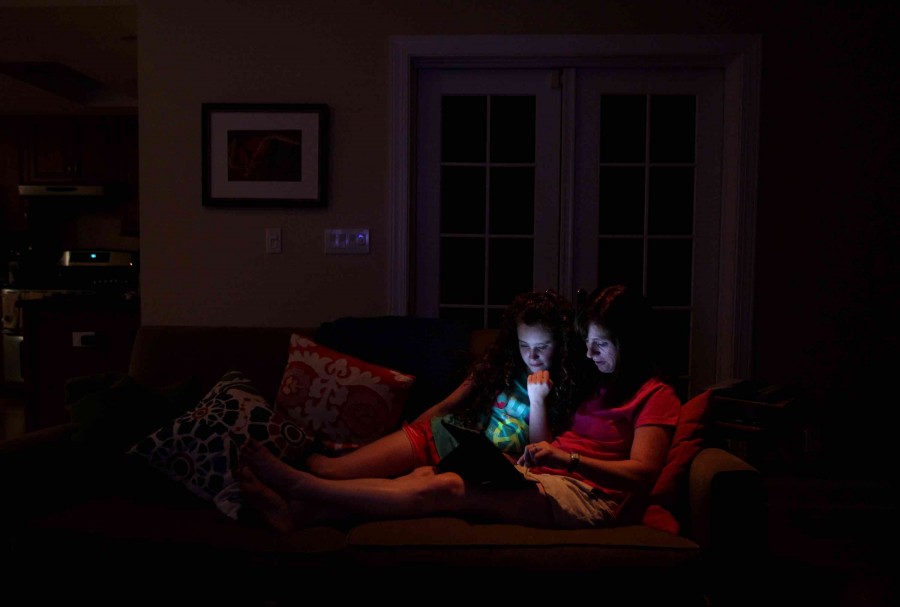Are Electronics Really Stealing Our Sleep?
Sheri Jacobs and her daughter, Jillian, 10, use an iPad as they relax on the couch at their home in Deerfield, Illinois, on June 29, 2012. Some doctors worry about light from electronic devices having a detrimental effect on sleep. (Chris Sweda/Chicago Tribune/MCT)
Do your parents constantly remind you that if you don’t put away the computer and go to bed now, you’ll gain weight, age faster, think slower, and feel more depressed? Well, according to a recent study, you may actually be getting more sleep than humans without electricity.
A study published in the Oct. 15 edition of the science journal, Current Biology, led by Jerome Siegel, a sleep researcher at UCLA, explored this topic. For 1,165 days, the study followed 94 adults between the ages of 20 and 55 from three preindustrial societies (societies with no electricity, no Internet, and no heating or cooling) – the Hadza in Tanzania, the San in Namibia, and the Tsimane in Bolivia – located near the equator.
The results? Whether male or female, the average adult slept only 6.4 hours each night, notably less than the seven to nine hours of sleep recommended for adults between the ages of 26 and 64 by the National Sleep Foundation.
The shockingly uniform findings across the three communities despite their isolation suggests that such sleep patterns may be the natural behavior of the human species in tropical climates. Since humanity originated in tropical Africa, did our ancient ancestors in reality sleep less than we do now?
However, despite getting less sleep, the adults in these preindustrial societies had lower blood pressure and atherosclerosis and even higher fitness than most adults in industrial societies.
Even more surprisingly, the Actiwatch-2 wristbands worn by the test subjects indicated that these adults don’t nap nearly as much as expected. Previously, scientists had speculated that humans naturally took afternoon naps, which would explain the yawns we all experience at 3 p.m. each day.
However, the study showed that the San, a hunter-gatherer society in Namibia, napped less than 7 percent of all days in the winter and less than 22 percent of all days in the summer.
Furthermore, adults in preindustrial societies seem to have an easier time falling asleep than those of us living in industrial societies. Only 1.5 to 2.5 percent of the Hadza, San, and Tsimane clans reported experiencing insomnia more than once a year – in fact, the San and Tsimane don’t even have a word for “insomnia” in their languages.
This finding contrasts dramatically against adults living in industrial societies, where 10 to 30 percent of adults report chronic insomnia.
Is there a pattern explaining the similar sleep habits of the Hadza, San, and Tsimane? Researchers found a correlation between sleep time and temperature.
Adults typically went to sleep when temperatures were falling (usually about 3.3 hours after sunset), and woke up, with vasoconstriction, during the coldest part of the day. This is usually before sunrise, except for the San, who woke up an hour after sunrise in the summer, which could be due to the fact that their summer mornings being about 6˚C cooler than those of the Hadza and the Tsimane.
Moreover, the test subjects slept about an hour more in the winter than in the summer. These statistics could be a result of the human body having to give off less heat to fall asleep.
So what does this study’s findings mean for you and me? Is sleep really as important as everyone claims? As Siegel told Scientific American, “Future work is necessary, but our data suggests that environmental manipulation may more effectively control sleep than any drug.”
Consider camping outside for a night or two. It’s fun!

Michelle Qin '19 is an editor for the Science and Technology section. As a senior, this is her fourth year of writing for The Banner. When she is not writing...


